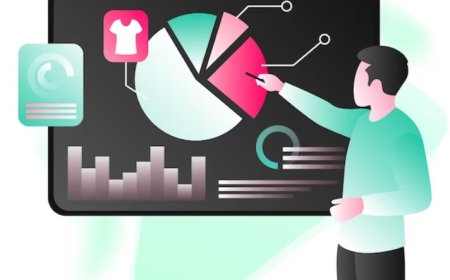A Guide to Data Analytics Certifications and Training Programs
This comprehensive guide explores top certification options, courses, and career opportunities in data analytics. Start your journey to becoming a certified data analyst today!

The introduction of A Guide to Data Analytics Certifications and Training Programs sets the stage for understanding the significance of data analytics in today's world. It highlights the purpose of the guide, which is to provide comprehensive information on various data analytics certifications and training programs available. Furthermore, it offers an overview of what readers can expect from the guide, including insights into different certification types and the importance of choosing the right program to align with their career goals and skill levels. This introduction serves as a foundational framework for the entire guide, emphasizing the relevance and relevance of data analytics in contemporary industries.
Understanding Data Analytics
What is Data Analytics?
Data analytics is the process of examining, cleaning, transforming, and interpreting data to discover meaningful insights, patterns, and trends. It involves the use of various tools, techniques, and algorithms to extract valuable information from large datasets. Data analytics plays a crucial role in aiding decision-making, solving complex problems, and improving business operations across various industries.
Why Pursue a Data Analytics Certification?
Pursuing a data analytics certification offers several compelling benefits:
-
Career Advancement: Data analytics is in high demand, and certification can open doors to better job opportunities and higher salaries.
-
Skill Validation: Certification validates your proficiency in data analytics, giving you credibility in the field.
-
Structured Learning: Certification programs provide structured coursework and resources to enhance your skills.
-
Global Recognition: Many certifications are recognized internationally, making you more marketable worldwide.
-
Staying Competitive: In a rapidly evolving field, certification demonstrates your commitment to staying current with industry trends.
Key Skills and Knowledge Areas in Data Analytics
Successful data analysts possess a combination of technical and soft skills. Key areas of knowledge and skills include:
-
Statistical Analysis: Data analysts need a strong foundation in statistics to understand data distributions, variability, and patterns. Proficiency in statistical concepts such as hypothesis testing, regression analysis, and probability is crucial for drawing meaningful insights from data.
-
Data Visualization: Effective communication of data findings is essential. Data analysts should be adept at using visualization tools like Tableau, Power BI, or Python libraries (e.g., Matplotlib and Seaborn) to create charts, graphs, and dashboards that convey complex information in a clear and accessible manner.
-
Data Cleaning and Preprocessing: Before analysis can begin, data often requires cleaning and preprocessing. Analysts should be skilled in data cleansing techniques, handling missing values, and transforming data into a usable format.
-
Programming and Scripting: Proficiency in programming languages like Python or R is crucial for data analytics. These languages are commonly used for data manipulation, analysis, and machine learning tasks.
-
Database Management: Data analysts often work with databases, so understanding relational database management systems (RDBMS) and SQL (Structured Query Language) is important for retrieving and manipulating data efficiently.
-
Machine Learning: While not always a primary requirement, familiarity with machine learning concepts and algorithms can enhance an analyst's ability to build predictive models and uncover more advanced insights from data.
-
Domain Knowledge: In many cases, data analysts work in specific industries such as healthcare, finance, or marketing. Domain knowledge is valuable for understanding the context and nuances of the data, enabling more relevant analysis and insights.
These skills are essential for a well-rounded data analytics professional and are typically covered in certification and training programs.
Types of Data Analytics Certifications
Vendor-Specific Certifications
-
Vendor-specific certifications are often tied to specific software or technology providers, such as Microsoft, Google, or SAS.
-
These certifications focus on the tools and platforms offered by the vendor and are valuable for professionals working in environments that use these technologies extensively.
-
Examples include the Microsoft Certified Data Analyst, Google Data Analytics Professional Certificate, and SAS Certified Data Analyst.
Industry-Recognized Certifications
-
Industry-recognized certifications are designed to validate a broad set of data analytics skills and knowledge, often without being tied to a specific vendor.
-
These certifications are widely respected and applicable across various industries, making them versatile for career growth.
-
Examples include the Certified Analytics Professional (CAP), Data Science Certification Institute (DSCI) Certification, and IBM Data Science Professional Certificate.
Academic Programs and Degrees
-
Academic programs offer comprehensive education in data analytics and data science.
-
These programs are typically offered at universities and can lead to degrees such as Bachelor's in Data Analytics, Master's in Data Science, or PhD in Data Analytics.
-
Academic programs provide a deep understanding of data analytics principles, research opportunities, and a structured curriculum for those seeking in-depth knowledge and research-oriented careers.
Choosing the Right Certification or Training Program
When embarking on your journey to become a certified data analyst, selecting the most suitable certification or training program is a pivotal decision. Here are key factors to consider when making this choice:
-
Determine your career objectives within the data analytics field. Are you interested in business intelligence, machine learning, or data engineering? Different certifications and programs may align better with specific career paths.
-
Evaluate your level of experience in data analytics. Entry-level certifications are available for beginners, while more advanced certifications cater to experienced professionals seeking specialization or career advancement.
-
Research the accreditation and reputation of certification bodies or training providers. Industry-recognized certifications from reputable organizations often carry more weight with employers.
-
Budget constraints and time availability are essential considerations. Some certifications may require substantial investments, both in terms of fees and study time. Assess whether the program aligns with your financial resources and schedule.
By carefully weighing these factors, you can make an informed decision that aligns with your career aspirations and personal circumstances.
Preparing for Data Analytics Certification
Prerequisite Knowledge and Skills
Before embarking on your journey towards a data analytics certification, it's crucial to assess and ensure you have the necessary foundational knowledge and skills. This may include a solid understanding of mathematics, statistics, and programming. Familiarity with data analysis tools and software, such as Python, R, or Excel, is often essential. Depending on the specific certification, prerequisites may vary, so carefully review the requirements set by the certifying body.
Study Materials and Resources
To prepare effectively for a data analytics certification, gather a comprehensive set of study materials and resources. This may include textbooks, online courses, video tutorials, practice exams, and reference guides. Consider both free and paid resources, as well as those offered directly by the certifying body. Seek out reputable sources that align with the content covered in the certification exam.
Exam Preparation Strategies
Crafting a successful study plan and exam preparation strategy is vital for certification success. Develop a study schedule that allocates sufficient time for each topic or skill area covered in the certification. Utilize study aids, flashcards, and note-taking techniques to reinforce your learning. Take regular practice exams to assess your progress and identify areas that require further attention. Join study groups or forums to collaborate with peers and gain insights from others pursuing the same certification.
Practical Experience and Projects
Theory alone is not enough in data analytics. Practical experience and hands-on projects are invaluable for reinforcing your skills and understanding. Work on real-world data analysis projects to apply what you've learned in a practical context. This could involve analyzing datasets, creating visualizations, and deriving actionable insights. Many certification programs also require candidates to complete projects as part of their assessment, so be sure to dedicate time to these assignments.
By diligently addressing these aspects of preparation, you'll be better equipped to excel in your data analytics certification journey.
Taking the Certification Exam
-
Registration and Scheduling: Before you embark on your certification journey, it's essential to register for the exam and schedule a date that aligns with your preparation timeline. Visit the official certification provider's website to create an account, pay the exam fee, and select a convenient exam center or online proctoring option.
-
Exam Format and Structure: Understanding the format and structure of the certification exam is crucial for effective preparation. Familiarize yourself with the number of questions, types (e.g., multiple-choice, practical exercises), and the allotted time. This knowledge will help you tailor your study plan accordingly.
-
Tips for Success: To increase your chances of success, adopt effective study techniques, and practice regularly. Utilize official study materials and practice exams provided by the certification body. Focus on weak areas and review key concepts thoroughly. Additionally, consider joining study groups or seeking guidance from experienced professionals.
-
Dealing with Exam Anxiety: It's natural to feel nervous before an important exam. Combat exam anxiety by maintaining a healthy lifestyle, getting adequate rest, and practicing relaxation techniques such as deep breathing. Arrive at the exam center early to minimize stress on the exam day. Trust your preparation and stay confident throughout the exam.
Post-Certification Advancements
After achieving your Data Analytics certification, it's time to propel your career further. Start by assembling a portfolio showcasing your projects and achievements. Engage in networking and join vibrant Data Analytics communities to exchange insights and stay updated with industry trends. Keep learning through workshops, webinars, and advanced courses for skill refinement. Consider exploring specializations within Data Analytics and pursue advanced certifications to deepen your expertise, opening doors to more complex and rewarding opportunities in the field. These post-certification steps will solidify your position as a proficient Data Analytics professional.
Top Data Analytics Training Programs
When considering data analytics training programs, several standout options consistently receive recognition for their quality and industry relevance. These programs typically offer comprehensive curricula, hands-on experience, and esteemed instructors. Some of the top programs include renowned institutions like Harvard University's Data Science Professional Certificate, the Google Data Analytics Professional Certificate, and the Data Science Specialization by Johns Hopkins University on Coursera. These programs are known for equipping learners with the skills and knowledge needed to excel in the field of data analytics.
The future of data analytics is poised for exponential growth and innovation, with increasing demand for skilled professionals. To seize the opportunities in this dynamic field, obtaining relevant certifications and training is paramount. Consider your next steps carefully, exploring suitable programs and resources. Embrace the journey with confidence, knowing that a certified proficiency in data analytics will open doors to a thriving career in this data-driven era. Take the leap and shape the future of analytics today.






























































